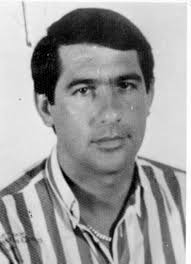Marco Tardelli - footballer
Joyous celebration lasting image of Italy's 1982 World Cup win
Marco Tardelli, the footballer whose ecstatic celebration after scoring a goal in the final became one of the abiding images of Italy's victory in the 1982 World Cup, was born on this day in 1954. The midfield player, who spent much of his club career with one of the best Juventus teams of all time, ran to the Italian bench after his goal against West Germany gave the Azzurri a 2-0 lead, clenching both fists in front of his chest, tears flowing as he shook his head from side to side and repeatedly shouted "Gol! Gol!" in what became known as the Tardelli Scream. Italy went on to complete a 3-1 win over the Germans in the Santiago Bernabéu Stadium in Madrid with Paolo Rossi and Antonio Altobelli scoring Italy's other goals. Tardelli, who was part of Italy's squad for three World Cups, had earlier scored against Argentina in the second group phase. Tardelli later said that he felt he "was born with that scream inside me" and its release was sparked by the sheer joy at realising a dream he had nurtured since he was a child, of scoring in the final of a World Cup. It meant that when he retired as a player in 1988 he could look back on winning international football's greatest prize as well as every competition in which he participated in club football. Read more…
___________________________________________________________
Maria Pia of Bourbon-Parma - exiled princess
Vote for republic forced King's daughter to leave
Princess Maria Pia of Bourbon-Parma was born into the Italian royal family on this day in 1934, the grand-daughter of King Victor Emmanuel III. Her father, Umberto of Savoy, would himself become King on her grandfather’s abdication but reigned for just 34 days in 1946 before Italy voted to become a republic and the royals were effectively thrown out of the country. Italians could not forgive Victor Emmanuel III for not doing enough to limit the power of the Fascists and for approving Benito Mussolini’s anti-semitic race laws. The constitution of the new republic decreed that no male member of the House of Savoy could set foot in Italy ever again. It meant that Princess Maria Pia, the eldest of Umberto’s four children, had to leave Italy immediately along with her brother and two sisters and all the other members of the family, bringing to an abrupt end the life she had known until that moment. Born in Naples, where the Villa Rosebery, once the property of the British prime minister, the Earl of Rosebery, had been renamed Villa Maria Pia by her doting father, the 11-year-old princess was removed to Cascais in Portugal. Read more…
__________________________________________________________
Riccardo Illy - businessman
Grandson of Illy coffee company founder who became firm’s chairman
Riccardo Illy, whose paternal grandfather, Hungarian-born Francesco Illy, founded the world-famous illy coffee company, was born on this day in 1955 in Trieste. Illy is president and former chairman of Gruppo illy and vice-chairman of illycaffè. Under his leadership, the company has expanded to include Domori chocolate, Dammann Frères teas, Agrimontana - which makes fruit preserves, jams and confectionery - and Mastrojanni, a winery located in the Montalcino region of southern Tuscany. It also holds a stake in Grom, a chain of premium ice cream parlours. The company now has a presence in 140 countries and as well as coffee shops the company also operates ice cream stores in Italy, as well as in New York, Malibu, Los Angeles, Paris, Dubai, Osaka, and Jakarta. Although the company’s roots are in Trieste, where Francesco opened for business in 1933, Gruppo illy Spa is based in Rome. Riccardo’s first job was as a skiing instructor at the Piancavallo resort in the Dolomites and a sailing instructor at Monfalcone, near Trieste. He married the food and wine journalist Rossana Bettini, with whom he had a daughter, Daria. Read more…














